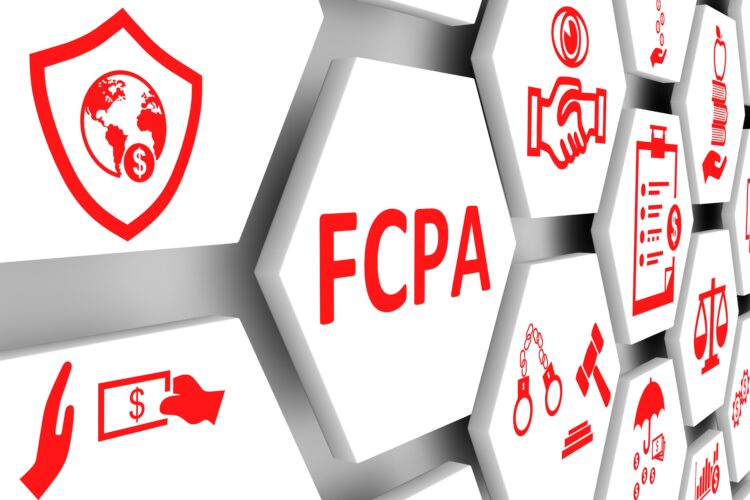June 28, 2022
The Foreign Corrupt Practices Act – or FCPA as it is often referred to – is an unusual yet powerful federal law in that it specifically targets activities by individuals and businesses that occur outside of the United States. While federal criminal laws typically do not provide for jurisdiction over events occurring in foreign countries, the specific intent of the FCPA is to prevent corruption in other countries by American entities and even those non-American entities that have some connection to the United States.
The primary purpose of the FCPA is to prevent corruption of foreign officials – e.g. providing money or gifts to a foreign official to induce that official to purchase goods or services from a provider – and to impose civil and criminal liability on those that do. Individuals and businesses who have been found guilty of FCPA violations or entered into agreements relating to civil and criminal liability for alleged FCPA violations are found across a wide spectrum of industries – from healthcare providers to film festival promoters.
FCPA enforcement actions are pursued by both the Department of Justice (DOJ) and the Securities and Exchange Commission (SEC). While the FCPA was originally enacted in 1977 following high-profile foreign corruption scandals involving companies such as Lockheed and Chiquita, government enforcement of the FCPA grew exponentially in the early 2000s, as did the amounts of the financial penalties involved. The total amount of sanctions imposed on entities pursuant to the FCPA was approximately $5.8 billion, or around $447 million per enforcement action.
The Elements of a Foreign Corrupt Practices Act Claim
The anti-bribery provisions of the FCPA makes it a civil and potential criminal violation of federal law to willfully use “the mails or any means of instrumentality of interstate commerce corruptly in furtherance of any offer, payment, promise to pay, or authorization of the payment of money or anything of value to any person, while knowing that all or a portion of such money or thing of value will be offered, given or promised, directly or indirectly, to a foreign official to influence the foreign official in his or her official capacity, induce the foreign official to do or omit to do an act in violation of his or her lawful duty, or to secure nay improper advantage in order to assist in obtaining or retaining business for or with, or directing business to, any person.”
In more colloquial terms, the FCPA makes it illegal for any entity covered by the FCPA to offer anything of value “directly or indirectly” to a foreign official to induce that foreign official to act in their benefit. Most commonly, this involves the payment of money or providing some other benefit to an official to induce that official to select a particular entity for a government contract or other benefit. The “directly or indirectly” clause is extremely significant, as FCPA violations often involve a payment from a business to an intermediary (who may bill themselves as some sort of legitimate facilitator of government action in line with local custom) who then passes on some or all of the payment to the government official.
Additionally, the FCPA includes a “books and records” provision that requires covered entities to maintain sufficient records of transactions so as to avoid a situation where illegal transactions are concealed from both discovery. Violations of the books and records provision of the FCPA can also result in a government enforcement action.
Persons Subject to FCPA Violations
Many individuals and entities who find themselves the subject of a potential FCPA enforcement action may be both surprised to know, first of all, the provisions of the FCPA exist, and, secondly, that the FCPA applies to their actions.
The FCPA applies to: 1) any citizen, national, or resident of the United States; 2) any business organized under the laws of the United States or any individual state, or which has its principal place of business in the United States; and 3) any domestic or foreign corporation that its securities registered in the United States or that is required to file reports under the Securities and Exchange Act of 1934. Thus, it is possible that a European country that pays bribes to a foreign official in Asia can face civil and criminal liability in the United States.
While businesses may have entity-wide practices found to violate the FCPA, in many cases FCPA liability can arise from the actions of individual salespersons acting on their own accord, believing they are simply following accepted local custom. Thus it is important for businesses to have robust anti-bribery training and compliance frameworks.
Contact Zweiback, Fiset & Zalduendo Today
The time to seek experienced counsel from a skilled white collar defense attorney is at the first signs of a potential government investigation, enforcement action or prosecution. Furthermore, businesses who become aware of potential FCPA violations within their own companies are advised to work with outside counsel to conduct an internal investigation and proceed accordingly to reduce civil and criminal exposure.
Often, the first steps in responding to a potential government proceeding are the most critical in setting the course for an ultimate outcome that defends one’s interests, reputation, and, in some cases, freedom. If you have reason to believe that you or your business may face a potential investigation, criminal charge, and/or enforcement action related to an alleged FCPA violation or other alleged bribery or corruption – or if you or your business are seeking to implement and/or improve compliance procedures to avoid the potential of a FCPA and/or bribery or corruption action – contact our office to speak with an experienced white collar defense attorney regarding your situation today.

